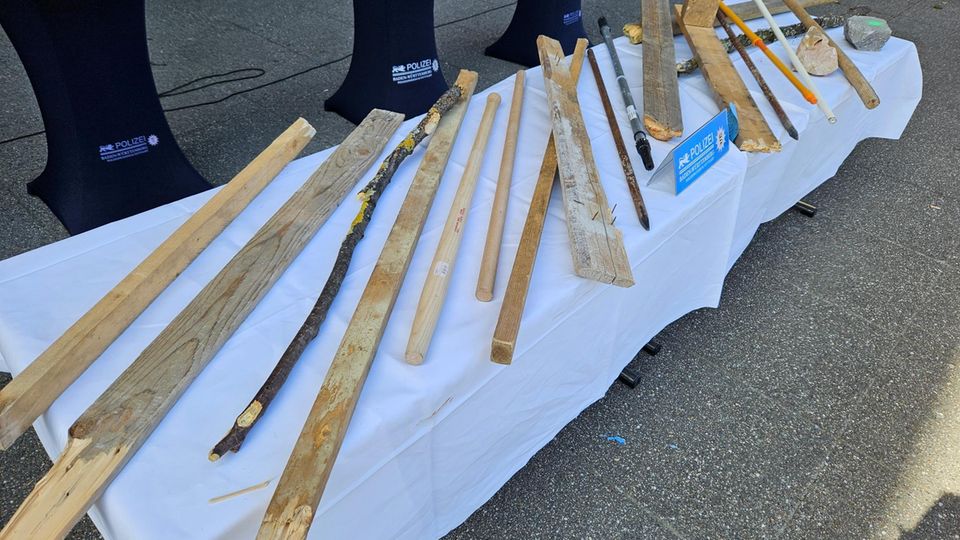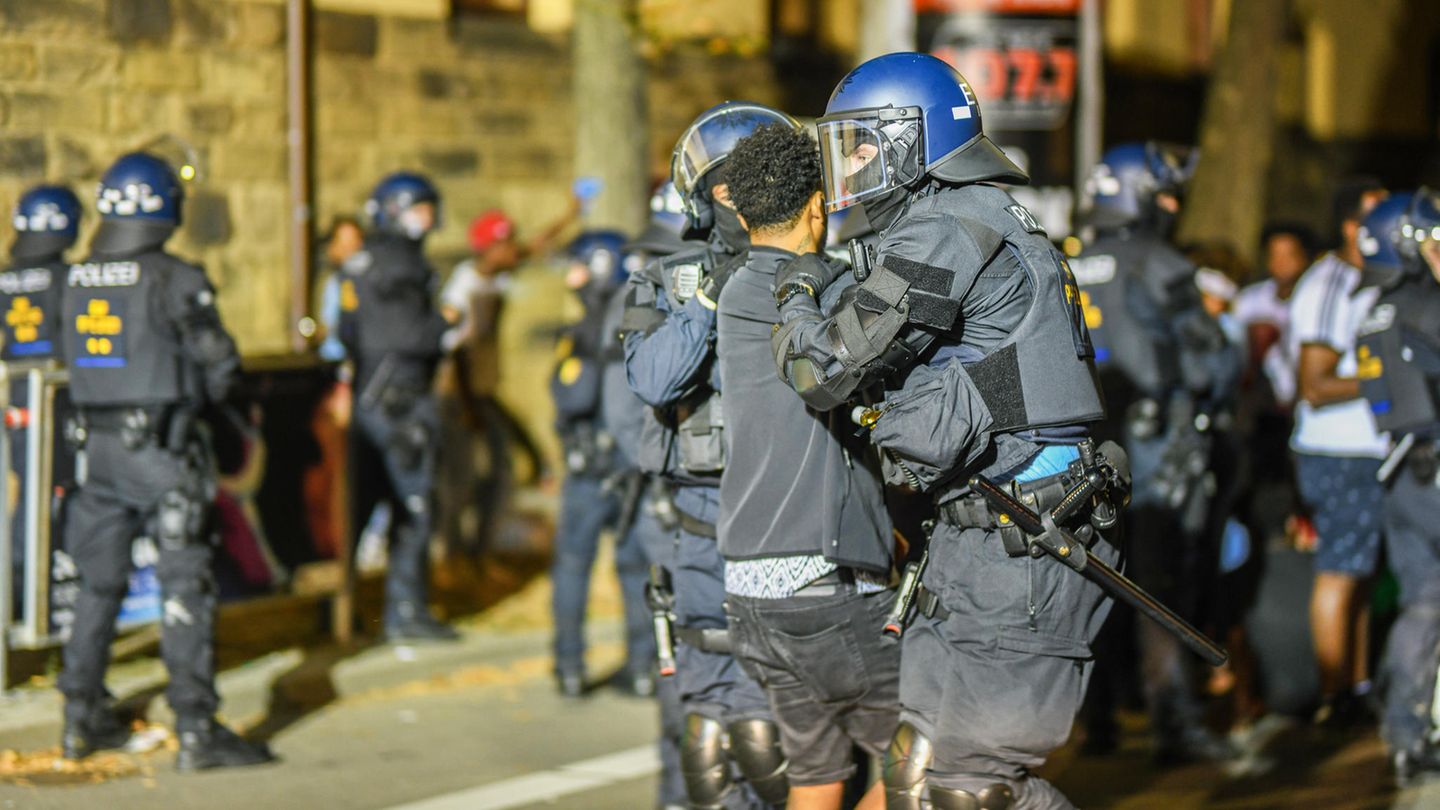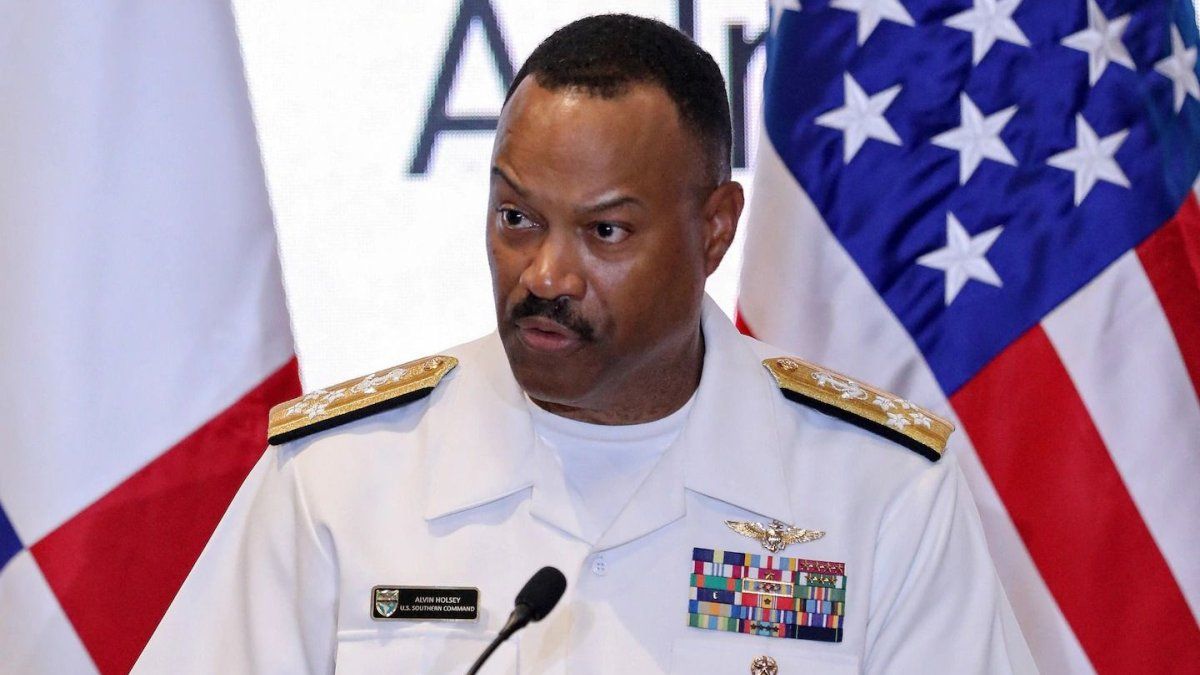Another Eritrea festival in Germany has turned violent – this time in Stuttgart. What is behind the repeated escalations?
It is a frightening arsenal that the Stuttgart police exhibited on Sunday: broom handles, metal rods, clubs, paving stones, even wooden slats studded with nails. All of this is said to have been used by violent criminals on Saturday on the sidelines of the Eritrea Festival in Baden-Württemberg’s capital to attack police officers. 27 of them were injured and reportedly suffered bruises, lacerations or flesh wounds.
A total of 228 suspects were arrested during the riots, and one man was taken into custody. Most of them live in the Stuttgart area, but many also live in Switzerland. The alleged rioters are being investigated, among other things, on suspicion of breach of the peace, serious breach of the peace, physical assault, damage to property and bodily harm, as well as grievous bodily harm and theft. “All suspects have Eritrean citizenship or are Germans with Eritrean roots,” said the Stuttgart police headquarters.

In the past there have been repeated, sometimes serious, riots on the fringes of Eritrea festivals. In July, riots in Gießen, Hesse, caused a nationwide stir (the star reported). What are the Eritrea festivals about? Why do the events regularly turn violent? And how is politics reacting to the escalations? The star answers the most important questions on the topic.
What is the Eritrea Festival?
The events in various German cities are organized by the Central Council of Eritreans in Germany. Officially it should be about music, readings or conversations. “This is a meeting center for all Eritreans who can exchange their experiences,” said Johannys Russom from the club’s board, according to “Spiegel” on the occasion of the festival in Giessen. However, critics accuse the organizers of being close to the dictatorship in the East African country and of propaganda for the regime. The Eritrean festivals are therefore a thorn in the side of the opposition and a reason for protests – which repeatedly culminate in violence.
What is behind the conflict between the groups?
Eritrea, with around three million inhabitants, is located in northeast Africa on the Red Sea and is largely isolated internationally. Since Ethiopia gained independence 30 years ago in a decades-long war, President Isayas Afewerki has ruled the country in a one-party dictatorship. Political parties are banned and freedom of expression and freedom of the press are severely restricted. There is neither a parliament nor independent courts or civil society organizations. There is also a strict military service and forced labor system, from which many people flee abroad. But the diaspora is deeply divided and is irreconcilably opposed to one another – the regime’s supporters on one side, its opponents on the other. The Federal Office for Migration and Refugees recorded around 74,000 Eritreans living in Germany in 2021.
Why did the violence in Stuttgart escalate?
The German security authorities are aware that the Eritrea festivals are explosive. However, the police were apparently caught off guard by the violence over the weekend. A total of around 90 participants attended the Eritrea Festival in a cultural center, and several hundred gathered to protest. After refusing an assigned meeting location, the counter-protesters became violent, police said. After the riots broke out, new emergency services were quickly ordered to Stuttgart – initially only around 20 officers were on site. “We were the buffer stop for an ethnic conflict that was fought on the streets of Stuttgart. The rule of law cannot and will not tolerate this type of riot. Every attack against us is one too many and calls into question the functionality of the rule of law,” said Police Vice President Carsten Höfler. Despite the potential for conflict, banning the event was out of the question. “Gatherings in closed rooms do not require registration,” said the city administration.
What are the reactions to the riots?
According to the DPA news agency, Federal Interior Minister Nancy Faeser (SPD) said: “Foreign conflicts must not be fought in our country.” The perpetrators of violence must be held responsible. Baden-Württemberg’s Prime Minister Winfried Kretschmann (Greens) said: “The images of brutal riots with targeted attacks against the police are disturbing and completely unacceptable.” Anyone who attacks emergency services is attacking the rule of law. “It is completely incomprehensible why this event was not stopped and thus the spread of the propaganda of this terrorist state was made possible,” said Marcel Emmerich, chairman of the Green parliamentary group in the Interior Committee of the Bundestag. In advance, one could have tried to obtain a ban in court “to at least send a clear signal,” he added. The deputy chairwoman of the Union parliamentary group, Andrea Lindholz (CSU), said that it had already been observed at previous similar events by people from Eritrea that the label “festival” was clearly being used to lead disputes between various groups from Eritrea in Germany. “The German state doesn’t have to put up with this,” said Lindholz. A permit can also be refused in advance if the character of a festival has obviously been abused, “if this is foreseeable and if it is not possible to prevent riots through appropriate requirements.”
The head of the German Police Union, Ralf Kusterer, criticized the fact that the unannounced counter-demonstration to the Eritrea meeting was assigned a demonstration area but did not stick to it. “We’re making a fool of ourselves here. We need to protect and strengthen our right to demonstrate and assemble. To do this, we have to take consistent action. Anyone who doesn’t comply will forfeit their right to do so.”
What’s next in Stuttgart?
The city of Stuttgart now wants to seek dialogue with local associations. “Our line in regular discussions with the various migrant organizations is that we in Stuttgart will not tolerate any arguments or riots related to the conflicts in the countries of origin.”
Another Eritrea event is also scheduled to take place in the state capital next Saturday. “It’s also about the question of whether an act of violence can have the say,” Johannys Russom from the Association of Eritrean Clubs in Stuttgart told the DPA. Protecting the event is a task of the state. “He has to be interested in this as a democratic country,” said Russom. Such events have taken place regularly and without incident over the past 40 years.
Sources: , , , DPA news agency
Source: Stern
I have been working in the news industry for over 6 years, first as a reporter and now as an editor. I have covered politics extensively, and my work has appeared in major newspapers and online news outlets around the world. In addition to my writing, I also contribute regularly to 24 Hours World.




